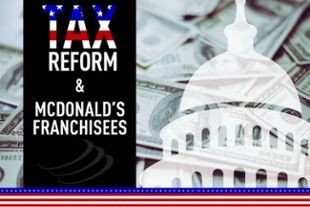President Trump and Republican lawmakers currently are considering a second round of tax reform legislation as a follow-up to last year’s Tax Cuts and Jobs Act (TCJA). As of this writing, there’s been no actual bill drafted. However, House Ways and Means Committee Chair Kevin Brady (R-TX) just released a broad outline or framework of what the tax package may contain.
Tax Reform 2.0: The Proposed Reductions for Businesses, Individuals
Posted by Concannon Miller on Tue, Jul 31, 2018
Topics: 2017 Federal Tax Reform
Tax Reform Greatly Expands Tax Breaks for Business Vehicles
Posted by Concannon Miller on Tue, Jul 17, 2018
Federal tax reform through the Tax Cuts and Jobs Act expands the first-year depreciation deductions for vehicles used more than 50% for business purposes. Here's what business owners need to know to take advantage.
Mid-Year Tax Planning: What Closely-Held Business Owners Should Know for 2018
Posted by Concannon Miller on Tue, Jul 10, 2018
Federal tax reform through the Tax Cuts and Jobs Act makes sweeping changes. But some of the new provisions won't necessarily be relevant to your closely-held business. Here's a quick reference guide to the major changes under the new law to help you understand what's changing.
In general, these changes are effective for tax years beginning after December 31, 2017. For businesses, these changes are permanent, unless otherwise noted.
Tax Reform Mostly Increases Depreciation Opportunities for McDonald’s Franchisees
Posted by Steve Bickert on Tue, Jun 26, 2018
Federal tax reform through the Tax Cuts and Jobs Act provides many new tax benefits to McDonald’s Owner/Operators, including some major depreciation changes, most of which are beneficial, as we interpret the tax law changes.
Under the new act, Bonus Depreciation is increased from 50% to 100% for qualifying property. The new provision also expands Bonus Depreciation to include both new and used qualifying assets, assuming they are acquired under an arms-length transaction. Thus, in a sales between operators transaction, the equipment allocation is now eligible for Bonus Depreciation.
Summer jobs can be an effective way to teach children about financial responsibility, encourage them to save for college or retirement, and provide them with spending money during the school year. If you own a business, consider hiring your child (or grandchild) as a legitimate employee. It can be a smart tax-saving strategy for employee and employer alike, especially under the Tax Cuts and Jobs Act.
Tax Reform: Ways to Maximize the New QBI Deduction, Bonus Depreciation
Posted by Tony Deutsch on Thu, May 31, 2018
Federal tax reform through the 2017 Tax Cuts and Jobs Act (TCJA) provided some of the most significant tax-saving opportunities for businesses in more than 30 years.
While the lower 21% tax rate for C Corporations garnered much of the attention, small businesses also received some advantageous new benefits. The challenge is that some of the new small business benefits are fairly complex.
This is especially true for the 20% Qualified Business Income (QBI) Deduction. It offers the greatest tax benefit to small businesses in more than 60 years, but obtaining the maximum deduction involves some sophisticated calculations and planning.
While tax planning is always valuable, it’s even more important for 2018. The TCJA contains significant changes that provide substantial tax savings, and also reduced deductions that will increase a business owners’ tax liability.
Tax Reform: Should Your Pass-Through Business Become a C Corporation? (Video)
Posted by Concannon Miller on Tue, May 22, 2018
Federal tax reform through the Tax Cuts and Jobs Act introduced a flat 21% federal income tax rate for C corporations for tax years beginning in 2018 and beyond. Under prior law, profitable C corporations paid up to 35%. This change has caused many business owners to ask: What’s the optimal choice of entity for my business?
Tax Reform Provides Mixed Bag of Benefits to Families with Children
Posted by Concannon Miller on Tue, May 15, 2018
Federal tax reform through the Tax Cuts and Jobs Act brought about the biggest tax changes in three decades, including some significant changes for families with children. Some families will come out ahead, while other families may not after the elimination of the person exemption, which was $4,050 per person in 2017. Here are several of the changes that may affect your tax situation.
Federal tax reform through the Tax Cuts and Jobs Act included a multitude of new tax benefits for businesses, including one for employers who offer paid family and medical leave.
The new Employer Credit for Paid Family and Medical Leave includes several caveats, including that it’s only available from Jan. 1, 2018 through Dec. 31, 2019. Despite the limited two-year window, the credit may be worth exploring for companies that offer paid FMLA leave.
Business Interest Deductions: What Businesses Need to Know about the New Limits
Posted by Concannon Miller on Thu, May 3, 2018
Federal tax reform through the Tax Cuts and Jobs Act (TCJA) imposes a limit on deductions for business interest for taxable years beginning in 2018. The limit, like other aspects of the law, has raised some questions for taxpayers. In response, the IRS has issued temporary guidance in Notice 2018-28 that taxpayers can rely on until it releases regulations. While the guidance provides some valuable information, it also leaves some questions unanswered.
The Prior-Law Limit Rules
Prior to the TCJA, corporations couldn’t deduct “disqualified interest” expense if the borrower’s debt equaled more than one and a half times its equity and net interest expense exceeded 50% of its adjusted taxable income (computed without regard to deductions for net interest expense, net operating losses, domestic production activities, depreciation, amortization and depletion). Disqualified interest included interest paid or accrued to:














